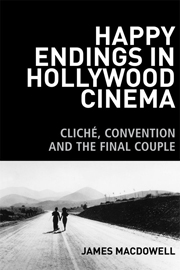Introduction The ‘happy ending’: the making of a reputation
Published online by Cambridge University Press: 05 October 2013
Summary
Take something as obvious as Hollywood's happy endings …
(Maltby 2003: 16)The Hollywood ‘happy ending’ is among the most over-utilised and under-analysed concepts in discussions of popular cinema. Though it has seldom been addressed in any detail, the term is nonetheless ceaselessly employed by audiences, filmmakers, critics and scholars, and is one that evokes a whole host of assumptions about mainstream American filmmaking. This book is the first to interrogate some of the most significant and tenacious of those assumptions, and it does so by delving more deeply than is usual into one especially famous feature associated with the ‘happy ending’: concluding a film with the union of a romantic couple.
One way of describing the status of the Hollywood ‘happy ending’ would be to say that it is burdened with a considerable reputation. Indeed, as we will see, for few phenomena of popular filmmaking does the matter of reputation seem more relevant than for the ‘happy ending’. A central aim of this book is to question that reputation. As such, let us begin by outlining some of its contours.
UBIQUITY AND HOMOGENEITY
As in the popular imagination so in academic discussion – the most fundamental assumption about the ‘happy ending’ is that it is a ubiquitous feature of Hollywood cinema. It has thus become virtually traditional for scholars to precede mentions of the term ‘happy ending’ with words like ‘standard’ (Dolar 1991: 38), ‘standardised’ (Mulvey 1978: 54), ‘predetermined’ (Maltby 2003: 16), ‘predictable’ (Schatz 1991: 152), ‘typical’ (Booker 2007: 42), ‘necessary’ (Mayne 1990: 363), ‘inevitable’ (Kracauer 1960: 65), ‘required’ (Sharrett 2007: 60), ‘requisite’ (Tally 2007: 129), ‘statutory’ (Brownlow 1987: 122), ‘mandatory’ (Kapsis 1990: 39), ‘expected’ (Rowe/Wells 2003: 59), ‘customary’ (Sterrit 1993: 10), ‘usual’ (Žižek 2001: 7), ‘formulaic’ (Umphlett 2006: 38), or – most frequently – ‘clichéd’ (Orr 1991: 380). The same impulse can provoke claims such as ‘few conventions of the Hollywood cinema are as noticeable to its producers, to its audiences, and to its critics as that of the happy ending’ (Bordwell 1982: 2), and even that this is the ‘most striking and persistent of all classical Hollywood phenomena’ (Wood 1989: 52).
- Type
- Chapter
- Information
- Happy Endings in Hollywood CinemaCliche, Convention and the Final Couple, pp. 1 - 18Publisher: Edinburgh University PressPrint publication year: 2013



